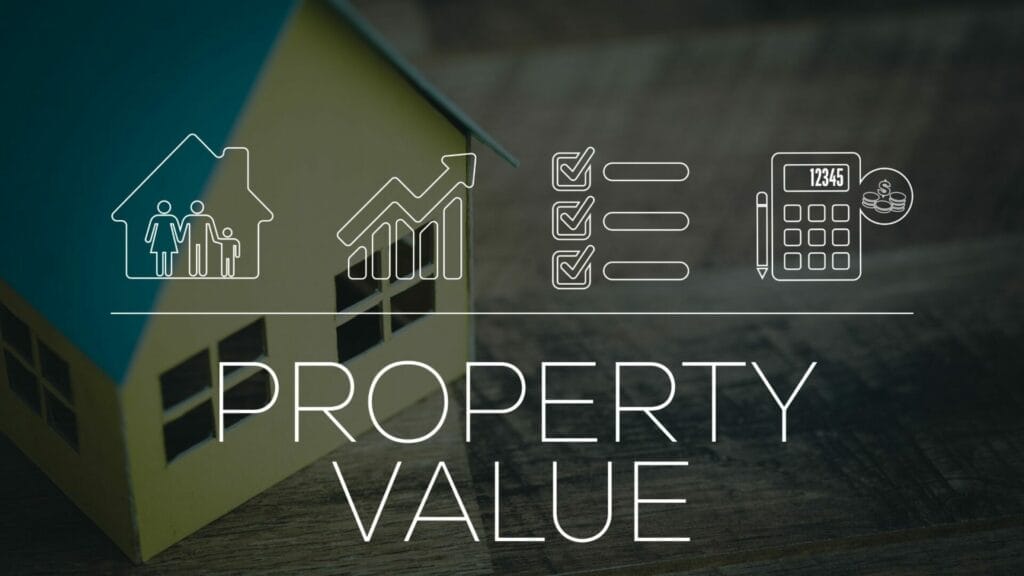
Understanding Commercial Property Value
The art of commercial real estate valuation is a critical skill in an industry teeming with over $1 trillion in yearly transactions. Our detailed guide on how to value commercial property is designed to elevate your expertise and give you a deep understanding of the valuation process.
Gain insights into the most effective valuation methods used by seasoned professionals. We’ll explore practical examples illuminating the intricacies of the income approach, which translates rental income into property value and is essential for evaluating properties like office buildings and retail spaces.
Unravel the subtleties of the sales comparison technique. This technique involves comparing your property to similar ones recently sold and adjusting for differences to pinpoint the most accurate value. This approach is invaluable for those dealing with unique or mixed-use properties.
Lastly, gain proficiency in advanced tactics like the discounted cash flow model. This model forecasts a property’s future earnings potential and discounts them to present value, offering a dynamic perspective on long-term investment viability.
You’ll be well-prepared to make informed, strategic investment decisions by assimilating these methodologies into your practice. This knowledge will bolster your confidence in property valuation and position you at the forefront of commercial real estate success.

Table of Contents
Key Takeaways
- Accurate commercial property valuation is key to informed decision-making and avoiding consequences like underinsurance and litigation, which can impact both investors and property owners.
- The value of commercial real estate depends on various factors such as market conditions, economic climate, demographics, and the physical state of the property, all of which influence its valuation.
- Several valuation methods, such as income, cost, sales comparison, and gross rent multiplier approaches, along with advanced techniques like discounted cash flow and price per square foot, may be used.
The Importance of Commercial Property Valuation
Informed decision-making in commercial real estate is dependent on commercial property valuation. This process allows investors and lenders to obtain the value of a property, helping strategic decisions regarding:
- acquisition
- divestment
- retention
Moreover, the valuation of commercial property supports financing processes and assists in establishing property value and determining fair market value.
Nonetheless, negative consequences may arise from inaccuracies in property valuation. Some potential issues from inaccurate valuation include:
- Underinsurance
- Inaccurate insurance coverage
- Potential litigation
- Downward pressure on rental rates
- Higher vacancy rates
- Leaving policyholders unprotected
These mishaps can impact commercial real estate investors and property owners alike.

Factors Influencing Commercial Property Value
Various factors influence the value of commercial real estate. Some of these factors include:
- Market conditions, including interest rates, economic conditions, and demographics
- Low interest rates can make borrowing more accessible for businesses
- The state of the economy affects the property market
- Demographics contribute to determining the level of demand
These factors make an impact on the value of a commercial real estate property.
The physical condition and age of the property are also important in the valuation process. Well-maintained commercial properties with modern facilities often command higher prices. On the other hand, neglected properties may face challenges in attracting tenants or investors, ultimately affecting their valuation.
Commonly Used Valuation Methods for Commercial Real Estate
Valuing commercial property is not uniform; it varies based on specific circumstances and needs. There are several methods to choose from, each with its unique advantages and limitations. The commonly used valuation methods for commercial real estate include:
- The income approach
- The cost approach
- The sales comparison approach
- The gross rent multiplier approach
Let’s explore each of these methods in more detail.
Income Approach
Widely used in commercial real estate valuation is the income capitalization approach. It converts an income stream into an indicator of market value, mainly through capitalization. To calculate the net operating income (NOI), operating expenses are deducted from the income generated by the property.
However, the income approach’s accuracy relies heavily on the projections’ validity and the inputs’ precision, including the NOI. When these inputs are accurate, the income approach is considered one of the most precise valuation methods. This method is particularly suitable for valuing income-generating commercial properties, such as:
- office buildings
- retail centers
- apartment complexes
Cost Approach
Another method frequently applied in commercial real estate valuation is the cost approach. It calculates the property’s value by combining the estimated land value with the depreciated cost of the building and other improvements. The process involves the following steps:
- Assess the current market value of the land.
- Determine the construction costs of the building and other improvements.
- Add the land value to the construction costs to establish the foundational value.
- Consider depreciation factors to determine the final value of the property.
Depreciation is determined by evaluating the cumulative depreciation and deducting it from the overall construction costs. This takes into account the decrease in value over time caused by factors such as wear and tear or obsolescence.
Sales Comparison Approach
The sales comparison approach estimates a property’s value by comparing it to similar ones recently sold in the same area. This method uses market data and the premise of similarity to assess a property’s value.
However, property features greatly influence the outcome of this approach. Adjustments in value are made based on variations in:
- physical characteristics
- ownership interest
- cash flow
These features make sure a fair and balanced comparison is found between comparable properties.
Gross Rent Multiplier Approach
Yet another method used in commercial property valuation is the gross rent multiplier approach. It represents the relationship between a commercial property’s price or market value and its gross rental income. The Gross Rent Multiplier (GRM) is calculated by dividing the sale price of a property by its annual gross rental income.
This approach is particularly effective for assessing rental properties, especially in the residential real estate market. It differs from other valuation methods by examining rental properties based solely on their gross income.

Advanced Valuation Techniques for Commercial Properties
Beyond the commonly used methods discussed above, more advanced valuation techniques offer more accurate and thorough property value assessments. One such method is the Discounted Cash Flow approach, which considers all expected future cash flows of the property and discounts them to their present value.
Another advanced valuation technique is the Price per Square Foot approach. This method determines the value of a commercial property by calculating its floor space and dividing the property value by the property size in square feet. However, it is more suitable as a comparative benchmark rather than a primary method of valuation.
Tips for Choosing the Right Valuation Method
Multiple factors determine the appropriate valuation method for your commercial property, such as:
- the type of property
- market conditions
- the purpose of the valuation
For instance, market conditions, such as a surplus of available properties, can result in lower prices, influencing the most suitable approach for a particular commercial property.
Additionally, the use of multiple valuation methods can result in significant benefits. It offers a fuller and more accurate assessment of the property’s value, reducing any biases or limitations of individual methods. This layered approach contributes to a more dependable and holistic valuation, which is essential in commercial property investment.
The Role of Professional Appraisers in Commercial Property Valuation
In commercial property valuation, professional appraisers hold a key position. They possess specific certifications and educational backgrounds and must adhere to the Uniform Standards of Professional Appraisal Practice (USPAP) to guarantee ethical conduct and professionalism in their valuations.
During the appraisal process, professional appraisers:
- assemble facts
- conduct extensive research on public records and demographics
- evaluate income-producing properties to determine their value
Various factors, including market price, comparable sales data, cost analysis, and income potential, influence the selection of a valuation method.

Preparing for a Commercial Property Appraisal
When it comes to a commercial property appraisal, thorough preparation is important. As a property owner, it is advisable that you:
- Make sure your property is well-maintained
- Gather all necessary documents, such as property tax bills and drawings
- Approach the appraiser with cooperation and politeness
Nonetheless, be aware of common mistakes to steer clear of when preparing for a commercial property appraisal. These include:
- Misrepresenting facts or aspects of the property
- Fabricating property information
- Misinterpreting the appraisal process
- Withholding valuable information
- Asking the appraiser to meet a specific value.
Partner with Point Acquisitions for Your Property Sale
If you’re considering selling your commercial property, Point Acquisitions is your dedicated partner through every step of the process. Our team is committed to providing you with a complete analysis of your property, guaranteeing you receive all the information you need to make the best decision.
Once we’ve evaluated every detail, we’ll extend a no-obligation offer tailored to reflect the true value of your asset. For more information or to discuss your property with us, contact Point Acquisitions today and take the first step toward a successful sale.
How to Value Commercial Property Summary
As we’ve explored, commercial property valuation is a complex process. From understanding the importance of accurate valuation to deciphering the various valuation methods, the process requires keen attention to detail and sound knowledge.
Whether you’re an investor or a lender, having a deep understanding of commercial property valuation is instrumental in your success in commercial real estate.

Frequently Asked Questions
How do I calculate the value of a commercial property?
To calculate the value of a commercial property, you can use the cost approach formula, which is Property Value = Replacement Cost – Depreciation + Land Value. Another method is to use Property Value = Net Operating Income / Capitalization Rate. Gross Rent Multiplier can also be used, which is calculated as Sales Price / Annual Gross Rents.
What value is most commonly used for commercial property?
The income capitalization approach is commonly used for commercial property valuation. It determines the property’s fair market value based on the income it could generate.
How do you calculate the future value of a commercial property?
To calculate the future value of a commercial property, use the formula: Value = Net Operating Income / Capitalization Rate to determine the property’s value based on its net operating income and cap rate.
How do you calculate the cap rate on commercial property?
To calculate the cap rate on commercial property, you can use the formula: (Net income / Purchase price) x 100, which gives you the percentage cap rate.
What is the significance of commercial property valuation?
Commercial property valuation is important as it helps investors and lenders make better property acquisition, divestment, or retention decisions. This is important for determining its value and potential.
About The Author

Jesse Shemesh
Disclaimer
Please note that Point Acquisitions is not a tax expert or tax advisor. The information on our blogs and pages is for general informational purposes only and should not be relied upon as legal, tax, or accounting advice. Any information provided does not constitute professional advice or create an attorney-client or any other professional relationship. We recommend that you consult with your tax advisor or seek professional advice before making any decisions based on the information provided on our blogs and pages. Point Acquisitions is not responsible for any actions taken based on the information provided on our blogs and pages.
1031 Exchange Capital Gains Tax Deferral
According to a 2021 report by the National Real Estate Exchange Services (RES), over 240,000 1031 exchange transactions were completed in the United States, totaling $100 billion. This impressive figure underscores the role of 1031 exchanges in the real estate…
Read More1031 Exchange Benefits
As of Q4 2023, the national vacancy rate for all commercial property types in the United States sat at 9.2%, according to CBRE’s latest insights and research. This represents a slight decrease compared to the previous quarter and suggests a…
Read More1031 Exchange Legal Considerations: A Must-Read Guide
You’re in the right place if you’re considering a 1031 exchange for your commercial real estate investments. Whether you’re a seasoned investor or just dipping your toes into the market, understanding the legal landscape of 1031 exchanges is key to…
Read More

